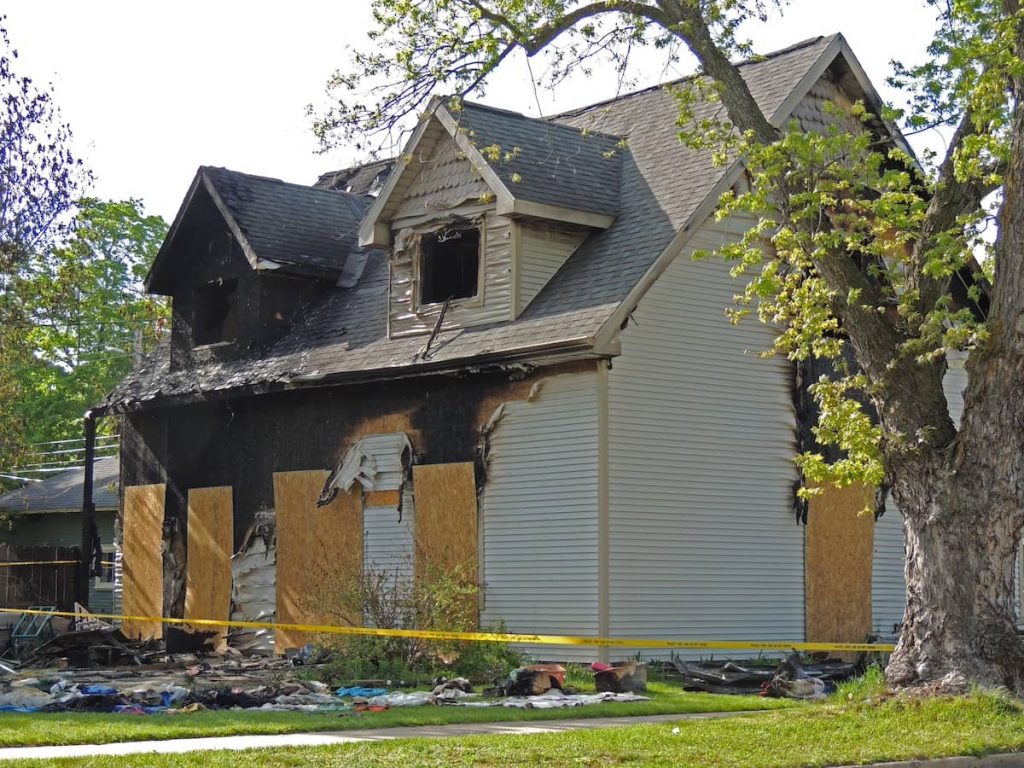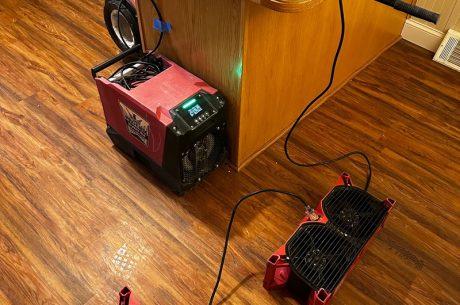Table of Contents
Fires can devastate homes and businesses, leading not only to immediate destruction but also to long-lasting effects on property and safety. When a fire incident occurs, the need for quick and effective response measures is critical.
One of the essential strategies in fire damage prevention involves the use of board-ups and tarping. This article will delve into the importance of these methods, how they work, and their critical role in securing properties following a fire.
Understanding Fire Damage | Fire Damage Prevention
Before discussing the preventative measures, it’s essential to understand what fire damage entails. Fire damage can range from minor scorching of surfaces to complete destruction of structures. Regardless of the extent, fire can produce:
- Structural Damage: Compromised support beams, damaged roofing, and weakened walls can occur.
- Smoke Damage: Residual smoke can penetrate materials, leaving an odor and causing health risks.
- Water Damage: Firefighting efforts often result in additional water damage, exacerbating the situation.
- Loss of Contents: Personal items, equipment, and even irreplaceable possessions may be lost in a fire.
The goal of board-ups and tarping is to limit further damage, enhance safety, and facilitate a smoother recovery process.
The Importance of Board-Ups | Fire Damage Prevention
Board-ups involve placing plywood or similar materials over openings in a structure, including windows and doors, after a fire incident. The following are key reasons why board-ups are crucial:

- Security: Board-ups help deter theft and vandalism, which often follow fire damage. An exposed property is an attractive target for looters.
- Weather Protection: Exposure to the elements can lead to additional damage. Rain, snow, or wind can worsen the situation, particularly when roofs are compromised. Board-ups protect the interior from weather-related issues.
- Contamination Control: After a fire, hazardous materials and debris may be present. Board-ups help contain these hazards and prevent them from affecting surrounding properties or the environment.
- Foundation Stability: After a significant fire, the integrity of the building could be compromised. Board-ups can provide temporary structural support, helping to stabilize weakened frames.
People Also Read : Revealed! Does Homeowners Insurance Truly Cover You from Fire Damage?
The Role of Tarping | Fire Damage Prevention
Tarping is another vital tactic in preventing fire damage from escalating. Following a fire, tarps are typically employed for the following reasons:

- Roof Protection: Fires can create holes in roofs. Tarps cover these openings to prevent water entry from rain and melting snow, which can lead to further structural deterioration.
- Preventing Mold Growth: Moisture intrusion is a leading cause of mold. By using tarps to cover vulnerable areas, property owners can significantly reduce the risk of mold contamination.
- Future Repairs Facilitation: Tarps keep the area ready for repairs. By protecting the site from additional damage, they allow repair crews to work more efficiently.
- Firefighter Accessibility: In some scenarios, tarping might help create manageable sections for firefighting efforts by reducing potential flare-ups.
People Also Read : Home Business Fire Causes Damage, Puts Short Hold on Pet Grooming Business
When to Consider Board-Ups and Tarping | Fire Damage Prevention
It is crucial to implement board-ups and tarping as soon as possible after a fire incident occurs. The following steps provide a guideline on the timing and process:
- Assess the Damage: A professional should assess the extent of the fire damage to determine the most urgent areas needing board-ups or tarping.
- Contact Professionals: While DIY methods might seem tempting, enlisting the help of professionals like Puroclean of Lansdale ensures that the property is secured safely and effectively.
- Implement Immediate Action: Board-ups and tarping should not be delayed. Quick action minimizes additional damage and secures the property.
- Document the Loss: Before executing repairs, document the damage thoroughly for insurance purposes. This can aid in your claims process.
In conclusion, fire damage poses an array of risks to both property and safety. The use of board-ups and tarping plays an indispensable role in mitigating these risks. By providing immediate security and weather protection, they not only preserve the integrity of affected properties but also lay the groundwork for eventual restoration. Property owners should emphasize the importance of these measures and coordinate with professionals like Puroclean to ensure their homes and businesses are adequately protected following a fire incident.
Why Choose Puroclean for Board-ups and Tarping? | Fire Damage Prevention
When fire strikes, protecting your property from further damage is crucial. That’s where PuroClean of Plymouth Meeting comes in. Our team provides swift and secure board-up and tarping services to prevent additional damage. With years of experience in emergency property damage restoration, we understand the importance of timely intervention. By choosing PuroClean of Lansdale for board-ups and tarping, you can trust that:
- Your property will be secured quickly and efficiently
- Further damage will be prevented or minimized
- Our team will handle the process with care and expertise
- You’ll receive prompt and transparent communication throughout the process
This is a key thing to do for fire damage prevention. Trust PuroClean of Plymouth Meeting
Why Choose PuroClean of Plymouth Meeting for Your Water Damage and Mold Remediation Needs in Lansdale?
When faced with water damage and potential mold growth, choosing the right restoration company is crucial. Here’s why Puroclean of Plymouth Meeting stands out as your trusted partner in the Plymouth Meeting PA, including Lansdale, Skippack, Norristown, and Ardmore:
- Local Expertise: We are a locally owned and operated company with extensive experience serving Plymouth Meeting and surrounding areas. We understand the unique challenges associated with water damage in our region, from seasonal weather patterns to specific building materials commonly used in our communities.
- Fast Response & 24/7 Availability: Water damage emergencies don’t wait
- for convenient hours. We offer 24/7 emergency response to minimize further damage and get the restoration process started swiftly. Our prompt response time ensures your property suffers less and recovers faster.
- Highly Trained & Certified Technicians: Our team comprises certified and highly trained water damage restoration technicians. They possess the necessary skills and knowledge to assess the situation effectively, develop a customized remediation plan, and execute the job efficiently and safely.
- Advanced Equipment & Technology: We invest in cutting-edge technology and equipment to ensure a thorough and efficient remediation process. This includes advanced drying equipment, industrial-grade dehumidifiers, and state-of-the-art mold detection tools.
- Insurance Navigation & Hassle-Free Claims: We understand the complexities of insurance claims. Our team will work directly with your insurance company to streamline the claims process and ensure you receive the maximum coverage for your restoration needs.
- Open Communication & Transparency: We believe in clear communication throughout the remediation process. Our team will keep you informed of every step, answer your questions promptly, and address any concerns you may have.
- Commitment to Customer Satisfaction: Your satisfaction is our top priority. We are dedicated to exceeding your expectations by providing exceptional service, high-quality workmanship, and a commitment to restoring your property to its pre-damage condition.
Protect Your Investment & Restore Your Peace of Mind
Don’t let water damage and potential mold growth overwhelm you. Contact PuroClean of Plymouth Meeting today at (484) 412-4422 for a free consultation. We’ll be there to guide you through the restoration process and ensure your property is restored quickly, safely, and efficiently.



 PuroClean of Plymouth Meeting
PuroClean of Plymouth Meeting